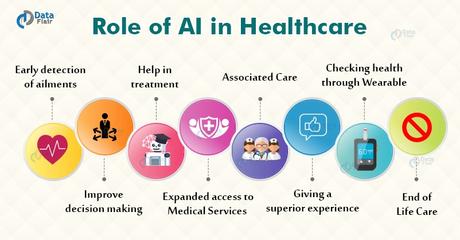Accenture estimates that the AI healthcare technology market will reach $6.6 billion by the end of 2021. Medical practitioners and facilities are utilizing Artificial Intelligence in healthcare to generate valuable insights, deliver better patient care, and speed up treatments for terminal illnesses.
The biggest benefit of AI and healthcare technologies is that it helps to deliver accurate results, faster. PathAI, a leading company in the healthcare sector using AI, is enabling pathologists to make accurate diagnosis by reducing errors. The company works with the Bill & Melinda Gates foundation to enhance its AI and healthcare capabilities.
Operations will always require the human touch to ensure that treatment is proper and has an emotional impact. On the other hand, the benefits of AI in healthcare relate to processing massive amounts of data and generating live-saving information along with valuable insights.
Read more: How HealthTech Helps to Build Cutting-edge Solutions for Patients
How is AI Used in Healthcare?
Healthcare facilities that analyze data properly reach conclusions that save patient's lives. AI in healthcare companies build Machine Learning algorithms, NLP-based solutions, and Deep Learning capabilities to analyze massive amounts of data.
For example - analyzing a patient's medical history and test reports can help companies deliver better care by understanding patterns in health. They can identify whether a person is more prone to certain diseases, has any kind of problems that might lead to future illnesses, or shows symptoms of something terminal.
While diagnosis is an important aspect of AI, it has other uses as well. Bioxcel Theraupatics is an Artificial Intelligence company that uses AI to identify new drugs and compounds for immuno-oncology and neuroscience. It is also using healthcare AI developments to determine new uses of existing medicines and how they can be used for better treatment.

What are Examples of Artificial Intelligence in Healthcare?
One of the best examples of Artificial Intelligence in healthcare is Google's AI program, which is 99% more accurate at detecting breast cancer than other programs. The AI analyzes mammograms and identifies the root symptoms of breast cancer.
Enlitic is another company that uses AI to derive actionable insights. It uses intelligent tools to streamline radiology diagnosis. It analyzes unstructured data like radiology images, blood tests, and more to provide real-time insights to doctors about a patient's immediate medical needs.
Babylon Health is one of the leading companies working in the healthcare sector. The primary aim of the company is to prevent diseases by using Machine Learning in healthcare to identify symptoms and risk of diseases to start treatment early on.
Read more examples of Artificial Intelligence in healthcare here.
What are the Applications of AI in Healthcare?
AI is revolutionizing the healthcare industry. It's applications lie in drug development, patient experience, diagnosis and reporting, process automation, managing and mining medical data, and more.
Most importantly, the diverse applications of AI in analyzing large datasets of unstructured data is providing doctors efficient insights on any patient's health, leading to better and more personalized care delivery outcomes.
Here are the 6 applications of AI in healthcare 2021 that are leading the way in the healthcare industry:--
Brain-computer interfaces
- One of the most interesting benefits of AI in the healthcare market is the usage of Brain-computer interfaces that aligns with the neurological system and allow patients to speak, hear and communicate if they have lost that ability.
- The brain-computer interfaces are supported by AI services. They help in decoding the neurological activities associated with hand movements, listening, and gestures, to help people communicate the same way as others do.
- Artificial Intelligence in the healthcare market could save millions of lives and give disabled people the ability to communicate like normal people. It is an excellent technology for people who suffer from spinal injuries and lose their ability to communicate via gestures.
-
Medical diagnosis
- Another promising role of AI in healthcare is a medical diagnosis. Machine Learning and Artificial Intelligence in healthcare study tons of datasets to provide an accurate medical diagnosis before it's too late for treatment.
- Medical imaging and scans backed by Artificial Intelligence are excellent tools to diagnose the disease at very early stages. The AI system goes through tons of images and scans of the body to identify any symptom of the disease that is being diagnosed.
- It allows the doctors to start the treatment before anything major takes place. Artificial Intelligence systems that aid in detecting cancer are becoming a life-saver for patients all over the world. They are increasingly becoming a tool to fight the disease and save more lives.
-
Drug development
- Medical practitioners and researchers are often conducting tests and examinations for developing drugs that can help patients recover better and faster. Machine Learning in healthcare helps researchers in drug development by going through millions of data points that assess the feasibility of drugs.
- It includes identifying the best chemicals for the composition of a drug and its impact. Through Machine Learning and Artificial Intelligence in healthcare, researchers can prepare different compositions and test their feasibility without risking the lives of human participants.
- While conducting drug trials, Artificial Intelligence machines can also monitor the different effects of the drug on participants and gather the data to provide valuable insights into the process.
-
Analyzing health records
- Similar to medical diagnosis, one of the most useful applications of AI in healthcare is analyzing the health record of the patients to clinicians and doctors. By wearing smart devices and wearables, AI apps can collect health data and update them in real-time for doctors to access it and make informed decisions.
- Artificial Intelligence systems can go through a patient's past medical history, combine it with their medical imagery and scans, and provide an accurate status of the patient's health. It can provide information on any disease that the patient might catch in the future.
- By analyzing the health records of patients, doctors and healthcare professionals get insights on the health of their patients and the next step they should take for keeping their health in check. Robots collect, process, and provide data much faster than human researchers can.
-
Virtual assistants
- Artificial Intelligence has allowed healthcare professionals to deploy virtual assistants that can help them with surgery and nursing. The AI systems can improve the surgical procedures by going through the pre-operation information and providing the right path to take.
- There are robot programs that act as virtual nurses to patients who need care on a regular basis. Patients can schedule appointments, cancel them, ask common questions, and update health information for real-time access by healthcare professionals.
- The virtual nurses also provide reminders for health checkups, diet requirements, medicine reminders, and assist the patients when there is any anomaly detected. There are highly advanced AI in healthcare that can alert the healthcare facility when the patient witnesses any differential health status apart from their regular diagnosis.
-
AI-enabled hospitals
- This is probably one of the newest applications of AI in the healthcare market. While hospitals are still mostly human dominant, AI applications are now taking over the reign for tasks and making care delivery smarter. Through artificial intelligence in healthcare examples, hospitals can enable medicine tracking, patient alert system, patient movement tracking, and assessing the staff performance for patients.
- One of the most significant benefits of artificial intelligence in healthcare is that it will decrease the chances of a dosage error, a common cause of potential injuries and health risks. Medical practitioners are often troubled by the wrong doses given by nurses. AI systems can help in providing accurate measurements and a proper schedule for the doses.
- Ai-enabled hospitals will also ensure that the payments, billings, and filing of formalities are done by AI systems that reduce the burden of medical staff from such mundane activities. It will leave more time for the staff to focus on activities that are directly related to patient care and outcome delivery.
Read more: RPA or AI - What will Benefit Your Organization the most
How AI can Improve Healthcare?
First of all, AI in healthcare industry will lead to better decision making. As a medical facility, it bodes well to process massive amounts of data that can show exactly what's wrong with a patient's health, symptoms of emerging diseases, and identify the actual status of a patient's health. Once medical institutions have such information, they can make decisions on when to start the treatment, proper healthcare plans, and precautions the patient should take.
However, the examples of AI in healthcare like Google and IBM cancer detection algorithms must also account for bias and discrimination in the system. Until now, AI in healthcare companies works on certain parameters that are used to diagnose, analyse, and generate insights.
But what about when these parameters don't match the criteria for unknown diseases? What if the technology analyses and suggests covid when it is just a minor flu? Such biases need to be taken care of and ethical practices need to be developed.
In the current situation, there are AI-based tools that can help in better covid-19 testing. Future pandemics can be identified with the help of an AI healthcare system that continuously analyzes large chunks of data from a massive number of people. That way, when any outbreaks happen, they can be controlled and the world is prepared with the right treatment plan.
In the treatment aspect, Machine Learning solutions and Artificial Intelligence show extreme potential in identifying which patients are the most critical and those that don't need further care. Health risks are increasing day-by-day, and there is a need for smart systems that can help professionals in minimizing those risks before it's too late.
Read more: How AI and Robotics is Transforming Healthcare
The future of AI in the Healthcare Industry
With the collection of massive amounts of data through wearable devices and out-patients departments, Artificial Intelligence would become inevitable to make sense of all that data. The role of artificial intelligence in the healthcare market would expand beyond generating insights and reach the level of taking actions along with the professionals.
It would also ensure that healthcare facilities reduce the errors and patients are less troubled. Service is another area which would see a major improvement in the coming years with the help of Artificial Intelligence. Robots would be deployed to reach an accident spot or critical zone of patients that require immediate attention.
They would also guide patients in the healthcare facility and ensure that the experience is world-class. Artificial Intelligence applications for healthcare are, therefore, an essential aspect of improving healthcare delivery outcomes.
BoTree Technologies is a leading Artificial Intelligence company for building healthcare solutions. We have a team of 30+ developers who build intelligent solutions for healthcare facilities. Contact us today for a free consultation.

